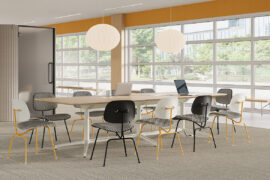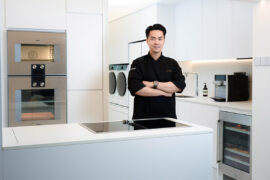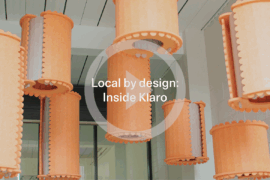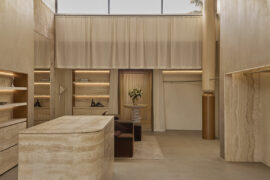How five friends created employment and economic security for their region.

May 29th, 2024
Across modern history, mass social changes have often been driven by youth movements, with groundswells created by those with the conviction to take matters into their own hands and be the catalysts for social equality. As these movements start to rumble their way through society, we see brands and industries shaped by their influence, with products and art created as an extension of the principles and beliefs of these champions of change.
Flashback to 1981 and a small, rural village in France’s Basque country saw a brand rise from the stressors of a sweeping economic crisis, where five friends got together to find an answer to job insecurity and inequality.

French manufacturer Alki was born from a bedrock of independence and conviction, with a group of friends founding a cooperative that continues to this day.
All decisions at Alki are made collectively and democratically, with all members invited to have their say in company matters. As younger generations join their ranks, the company is constantly reinvigorated and kept in step with the social climate, while, in turn, the newer generation is nurtured into its ethos and mentored to become future company and society leaders.
Beyond the internal workings of the company, Alki sources 80% of its external suppliers from within a 100km radius, ensuring the brand exists not just for their own success, but for development of their region, sustainability, and the equal redistribution of wealth.

While the social climate that led to Alki’s formation 40 years ago has since changed, their activism has not, with the brand turning its attention to sustainability and securing the economy of the Basque region.
In 2003, to ensure the future viability of the business, and in turn the livelihoods of its workers and suppliers, Alki formed a collaboration with industrial designer Jean Louis Iratzoki. With the creative direction of Iratzoki and the experience of its in-house craftsmen, Alki’s collection is now known across the world for its honest use of materials and clean aesthetic, as well as its quality and durability.

In 2015, Alki set a benchmark in the furniture design market with the first chair made from plant-based material. The shell of the Kuskoa Bi chair is made of Bioplastic PLA (Poly Lactic Acid) produced from corn starch, sugar cane and vegetable fibres, no plastics. Combined with the timber frame, the Kuskoa Bi is constructed from 100% renewable materials.
Last year Alki released the Xume chair which uses the world’s most recycled and recyclable material – PET – to create a felt-like moulded seat and back. Designed to be fully disassembled, the Xume allows for the replacement of the seat and back as well as easy recycling of its components – a feature present in many Alki designs – thereby guaranteeing the longevity of the product.


Looking to the future, Alki has embarked on its biggest display of activism to date – a state-of-the-art environmentally-friendly facility that will create new jobs while minimising their environmental footprint. Designed so that it will not require heating or cooling, taking maximum advantage of natural light, and operating on 100% renewable energy, the new facility will optimise their manufacturing processes while reducing their VOC emissions by 80%. In addition, all wood waste will be used in the production of by-products thus contributing to Alki’s sustainable resource management.

Design Nation is a leading provider of designer furniture and lighting in the Australian architecture and design industry, offering an extensive range of European and local brands. With over 25 years’ experience in the commercial furniture sector, and flagship destinations in Sydney, Melbourne, and Brisbane, Design Nation has established itself as one of the most respected names in the field servicing workplace, hospitality, residential and healthcare environments.
Design Nation
designnation.com.au/



INDESIGN is on instagram
Follow @indesignlive
A searchable and comprehensive guide for specifying leading products and their suppliers
Keep up to date with the latest and greatest from our industry BFF's!

For those who appreciate form as much as function, Gaggenau’s latest induction innovation delivers sculpted precision and effortless flexibility, disappearing seamlessly into the surface when not in use.

Herman Miller’s reintroduction of the Eames Moulded Plastic Dining Chair balances environmental responsibility with an enduring commitment to continuous material innovation.

Now cooking and entertaining from his minimalist home kitchen designed around Gaggenau’s refined performance, Chef Wu brings professional craft into a calm and well-composed setting.

In an industry where design intent is often diluted by value management and procurement pressures, Klaro Industrial Design positions manufacturing as a creative ally – allowing commercial interior designers to deliver unique pieces aligned to the project’s original vision.

Herman Miller’s reintroduction of the Eames Moulded Plastic Dining Chair balances environmental responsibility with an enduring commitment to continuous material innovation.

Designer-maker Simeon Dux creates finely crafted timber furniture with longevity, precision and heritage at its core.
The internet never sleeps! Here's the stuff you might have missed

COX Architecture and Hassell have announced that they have been awarded the design contract for the new Brisbane Stadium.

At Dissh Armadale, Brahman Perera channels a retail renaissance, with a richly layered interior that balances feminine softness and urban edge.